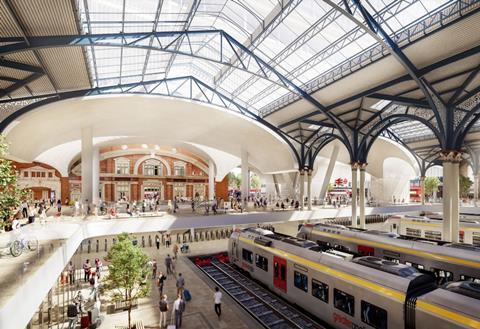Westminster and Hackney councils among onslaught of objectors to planning application expected to be heard later this year
Sellar and Network Rail’s £1.5bn plans to redevelop Liverpool Street station in the City of London have been met by a huge wave of opposition from members of the public and its official consultees in the last few months.
More than 2,000 objections have been attached to the planning application since it was made public last October from people opposing its perceived impact on the grade II-listed Victorian station.
In all, 2,152 objections have been lodged while just 28 letters of support have been sent in.
Two neighbouring councils, Westminster and Hackney, have also lodged official objections along with several heritage groups serving as statutory consultees to the application, including government advisor Historic England.
Designed by Stirling Prize-winning practice Herzog & de Meuron, the scheme would see a 20-storey office building cantilevered above the adjoining grade II*-listed former Great Eastern Hotel and a 1980s extension to the main station building demolished.

Concourse areas inside the station would be extensively redesigned with a new roof structure and three oval-shaped escalators, and views of the train shed which are currently obscured would be opened up.
The unusually large number of objections will be considered by the City’s planning officers in their recommendation to approve or reject the scheme ahead of its planning committee decision, which the council says could be towards the end of this year.
One objector who had worked on the successful campaign in the 1970s to save the station from demolition described Sellar’s proposed redevelopment as “barbaric”.
“I was a member of the original Liverpool Street Station Campaign in the 1970s, which saved the historic station from being converted into an overdeveloped version of Euston,” George Allan said.
“The compromise outcome won plaudits from both the architectural and conservation communities. Now, this achievement is under threat.”
Another objector, Victoria Blackie, wrote: “This is not Dubai, we love our heritage and want to see it in our city so please let us keep our heritage and stop rebuilding London and making it bland concrete and steel.
“Too many interesting buildings have already gone, you are ruining the character and heritage of our capital city and changing it into a boring, faceless place that could be in any country or town.”
Hackney council has objected to the proposals due to potentially harmful effects to the nearby South Shoreditch Conservation Area, which it said had not been addressed in the application’s heritage assessment.
The council added that it “shares the view of many other stakeholders that the proposals, by virtue of their sheer, overwhelming bulk and monolithic scale and form, represent ‘substantial harm’” to the former Great Eastern Hotel, the Bishopsgate conservation area and the New Broad Street conservation area.
Westminster, though further away from the site than Hackney, is objecting to the scheme based on its perceived impact on views of St Paul’s Cathedral from the west.
It said the proposed 20-storey block would appear directly behind the cathedral, eroding its silhouette by blocking out an area which is currently clear sky and appearing to draw the City’s eastern cluster of towers closer.
Tower Hamlets, which is the closest London borough to Liverpool Street station, is yet to provide its response to the City.
Historic England has long opposed the redevelopment, describing it in 2022 as “oversized and insensitive” and making it clear that it would submit a strong objection if a planning application was submitted.
The body has now followed through on its warning with a stinging official objection opposing the plans on the “strongest terms”, arguing the scheme would cause “extraordinarily high levels of harm to a number of designated heritage assets, some of the greatest importance”.
“The proposals would entirely remove the significance of the 1992 trainshed and profoundly damage the character of the station as a whole,” it said.

“They would undermine the special historic and architectural significance of the hotel through the alterations proposed to change its use, physical reorganisation and the addition of a highly overbearing upward extension.”
The letter of objection said this harm would go “to the heart” of the significance of the site while agreeing with Westminster council’s concerns over the scheme’s impact on St Paul’s.
Like many other objectors, Historic England also argued that the scheme appeared to breach several parts of the National Planning Policy Frameworks’ requirements for sustainable building, which it described as “deeply concerning”.
“These proposals would procure extensive commercial development, coupled with improvements to transport infrastructure, at the expense of extraordinary harm to the capital’s historic environment,” it said.
Other consultees which have lodged strongly worded objections include the Victorian Society, Save Britain’s Heritage, the Georgian Group and Historic Buildings and Places.
Sellar and Network Rail have said the development can do for Liverpool Street what work at other transport hubs in the capital has done for their surrounds.
Sellar development director Barry Ostle said last year that “the scheme that will emerge in terms of the public consultation will have responded to people’s views that have come through over the last couple of months and I think you will see some fantastic enhancements to it”.
He added: “What is emerging is a building that I would describe as having an extremely calm, almost serene feel to it that would sit in a very respectful counter-position to the Victorian building.”
Under Sellar’s timetable, work could start in the second half of next year with the job being completed in 2029.
Others working on the Liverpool Street deal include cost consultant and project manager G&T, engineer WSP and landscape firm Townshend. Mace is providing pre-construction advice.



























No comments yet